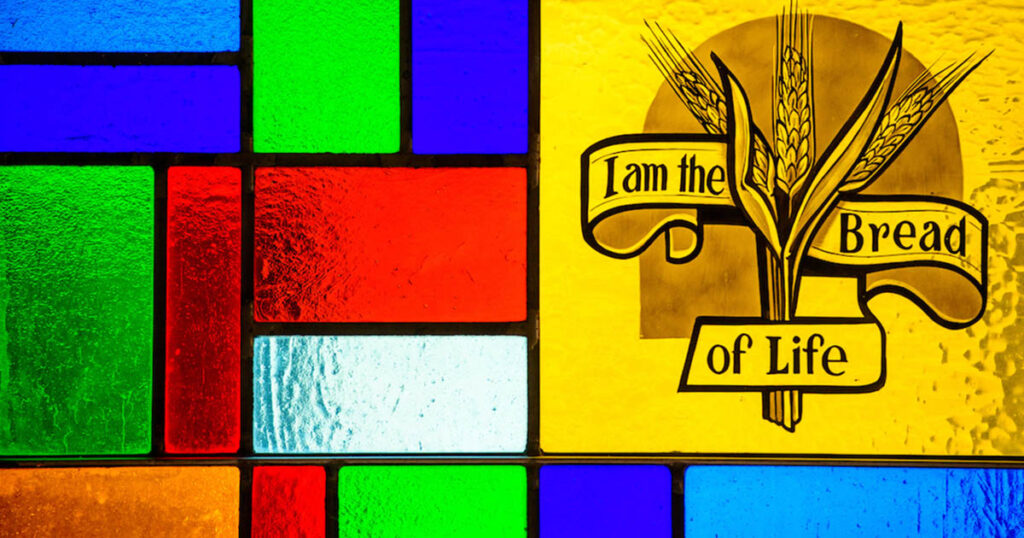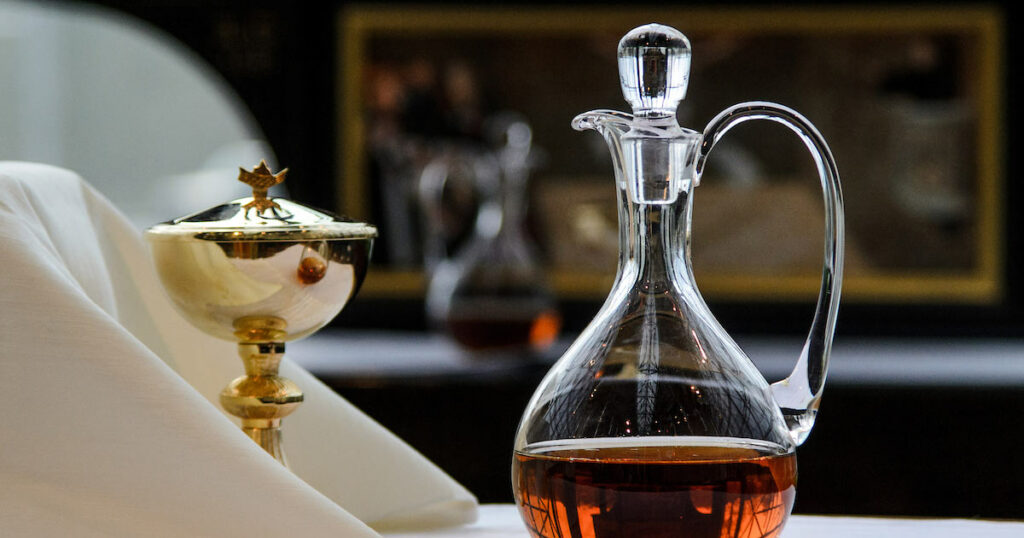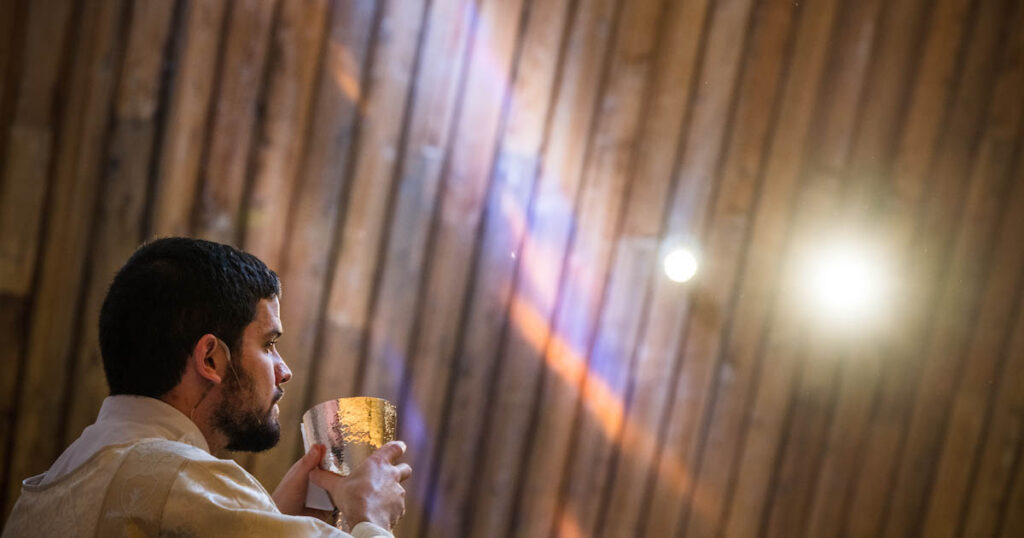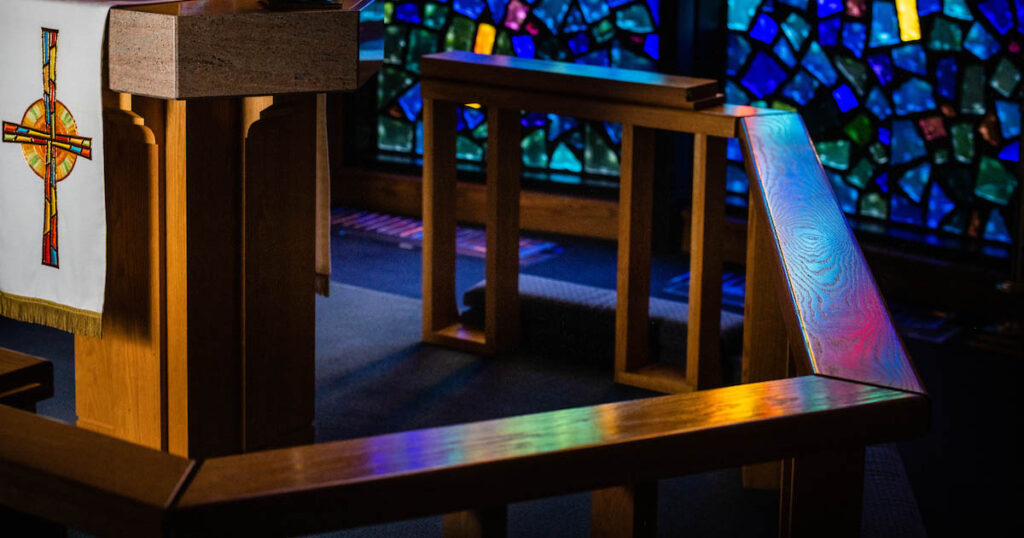3. In love … encourage your neighbor to “take the medicine Jesus gives”!
It is not fanatical for pastors and members to desire the weekly opportunity to commune. They long for the recovery of Jesus’ gracious gift that, for centuries, went hand in hand with the sermon. In the Reformation, Luther zealously worked to recover this practice while removing abuses in the Roman Catholic Mass. His most profound change was insisting someone must be present to receive the Sacrament. He stopped unscriptural private masses said by solitary priests for the dead, for special needs and for payment.
Luther knew the Sacrament to be Christ’s doing and not ours. As he ended unscriptural masses, he was equally concerned that Jesus’ gift be provided in weekly worship when desired. He instructed pastors to provide weekly service with Holy Communion for those who desired to receive Jesus’ forgiving gift, even if there was only one member. That others attending the service may not have desired to commune did not prevent Jesus from serving those who did.
For the neighbor
Luther’s heart for those in need of Christ’s promised forgiveness and love in the Sacrament mirrors the concern for others in Scripture. St. Paul writes, “In humility count others more significant than yourselves. Let each of you look not only to his own interests, but also to the interests of others” (Phil. 2:3–4; see also Phil. 2:1–2). In seeking the good of one’s neighbor (1 Cor. 10:24), we seek their advantage that they may be saved (1 Cor. 10:33). “Let each of us please his neighbor for his good, to build him up” (Rom. 15:2).
Christians pray daily for God’s kingdom to come for their neighbor’s welfare, for their protection against temptation and for their deliverance from evil. These petitions voice the Christian concern for their neighbor’s welfare. In looking out for the interests of others, we seek for our neighbor to be built up in the faith, comforted by the Gospel.
‘In this together’
In looking out for others in the recent pandemic, a valid concern was to minimize personal contact for the most vulnerable, the aged and the ill. Businesses sometimes shamelessly pandered the phrase “we’re all in this together” in their advertisements. In the Christian church, there is nothing artificial about the phrase “we’re all in this together.” Over and over again Scripture encourages concern for “one another.” Our greatest concern for one another as Christians, however, is not avoiding personal contact with the neediest, vulnerable or weak. Rather, we do all we can to bring the personal contact of Jesus to them.
As Christians love their neighbors, they often help a sick or hurting fellow member receive the treatment and medicine their earthly physician prescribes. They will inconvenience themselves to provide transportation for an appointment or pick up a prescription. They may pack a walker or wheelchair and use precious time to sit patiently in a waiting room. They desire to love their neighbor by giving them every opportunity to receive the healing medicine they need.
The Great Physician’s medicine
This same caring attitude should also exist for those who desire the medicine that the Great Physician administers among His gathered people. Some members may not feel the same weakness or need for this gift as a fellow member. However, in bearing with one another with compassionate hearts (Col. 3:12–13), surely the compassion Jesus pours out at His Table bears consideration. As we seek to help others bear their burdens (Gal. 6:2), surely it is kind and caring to help others receive this burden-lifting gift from Jesus. In seeking to love our neighbor as ourselves, the healing consolation Jesus bestows in this gift should not be overlooked or downplayed. As we sing,
Firmly hold with faith unshaken
(LSB 627:5)
That this food is to be taken
By the sick who are distressed,
By hearts that long for peace and rest.
Why should the Great Physician have opportunity to bring His healing medicine to His church in weekly worship? Because among His gathered guests there are always those who are sick with the effects of sin. Those near us may be pressured by stress, aching from loneliness, struggling with doubt, grieving a family member fallen from the faith, wearied by unrelenting physical pain, verbally or emotionally or physically abused, accused by vocational failures or facing terminal illness. Christians could multiply this short list from their own daily struggles.
Seeking to measure our need for God’s gifts of grace with our feelings is perilous work. It is especially perilous when our preferences limit the opportunity to commune for our brothers and sisters in the pews. This is more than a simple matter of personal preference about what we do. Holy Communion is not something we do. It is what the living Christ, here and now, in the flesh, does for us and also for those who gather with us.
This gift is the Lord’s healing medicine. With it, He intimately unites with those grieving, crippled with fear, rebuffed in their efforts to reconcile or tempted to despair. As we sing, “With Thee, Lord, I am now united; I live in Thee and Thou in me” (LSB 619:2). The Lord says to those dealing with all manner of hurt and suffering: “Given for you.” “Shed for you.” It is His personal prescription for those facing a wide range of threatening and draining needs. The Great Physician offers medicine in this gift that surpasses any prescription offered by any earthly doctor or health advisor. As we sing, “Jesus comes today with healing, Knocking at my door, appealing, Off’ring pardon, grace, and peace” (LSB 620:1).
Through the roof
Consider the faithful friends who helped the paralytic receive healing in the presence of Jesus (Mark 2:1–12). They carried him to the house where Jesus was. When they could not get near Jesus, they opened the roof and let down the bed on which the paralytic lay. This man’s greatest need for healing was immediately addressed by the Lord, “Son, your sins are forgiven” (Mark 2:5). Amid questioning about His authority to forgive, Jesus gave more healing, “Rise, take up your bed and walk” (Mark 2:9).
Four men brought this person into the presence of Jesus to receive His healing. Their love for their friend is unsurpassed in manner and magnitude. They did not question Jesus’ doings as the scribes did. They trusted Christ’s full authority to forgive and heal. They loved their friend, and they had faith in Jesus to help him. Christians today reflect that faith and love when they assist their brothers and sisters in receiving Christ’s healing gifts.
The medicine offered by Jesus in Holy Communion is incomparable. Because the divine and human nature are united with each other in Him, Christ Jesus can say, “Where two or three are gathered in my name, there am I among them” (Matt. 18:20). He comes not as an apparition or virtually. He comes in the flesh to serve us. Because of this personal union of the divine and human nature, our Confessions say, “His flesh is a truly life-giving food and His blood a truly life-giving drink” (SD VIII 76). Because of the personal union, Luther held that Christ’s blood was God’s blood and that one drop was enough to save the world.[1] We are not wrong to sing, “Oh, wondrous food of blessing, Oh, cup that heals our woes” (LSB 642:1).
The Great Physician offers medicine at His Table that heals more than we can ever see and feel. “Firmly hold with faith unshaken That this food is to be taken By the sick who are distressed, By hearts that long for peace and rest” (LSB 627:5). The healing He offers to us and to our brothers and sisters in Christ reaches beyond every earthly struggle and illness: “Our hungry mouths from Him receive The bread of immortality” (LSB 624:5).
Weekly medicine
“Why should the Great Physician have opportunity to bring His healing medicine to His church in weekly worship?” Because among His gathered guests each week stand the sick and suffering, those seeking His healing. Should we not lovingly aid our neighbor in receiving the healing medicine the Lord administers? “The Lord is near to the brokenhearted and saves the crushed in spirit” (Psalm 34:18). In His Supper, He comes to place His holy body and His holy blood into their mouths. So we sing, “All human thought must falter — Our God stoops low to heal, Now present on the altar, For us both host and meal” (LSB 639:2).
The stanzas of another hymn beautifully confess the wholeness needed by all the hurting faithful: It is wholeness only Jesus gives.
O gracious Lord, I firmly am believing
Your boundless love will bless each faithful soul,
As from this altar we are here receiving
Your body and Your blood to make us whole,
Your body and Your blood to make us whole.
Heavenly Bread, my life and benediction,
(LSB 635:1, 5)
This cup You give can take away each ill.
Come and relieve my soul from all affliction;
Calm ev‘ry sigh until my heart is still,
Calm ev‘ry sigh until my heart is still.
[1] Martin Luther, What Luther Says: An Anthology (St. Louis: Concordia, 1972), #567, #568.






Another way to help those who are distressed is to listen at length without passing judgment, dishing out unsolicited advice, or expecting any easy fix. Say out loud that you care. And if a potentially helpful way forward comes to mind, offer your suggestion tentatively and humbly, knowing that the extent of both the problem and the solution may lie well beyond your personal knowledge and experience.
Then pray with them if they will allow it, pray for them after you depart, and rather than say, “Call me if you need anything,” take the initiative yourself to check on them before long.
“Now you are the body of Christ and individually members of it.” 1 Cor. 12:27 ESV